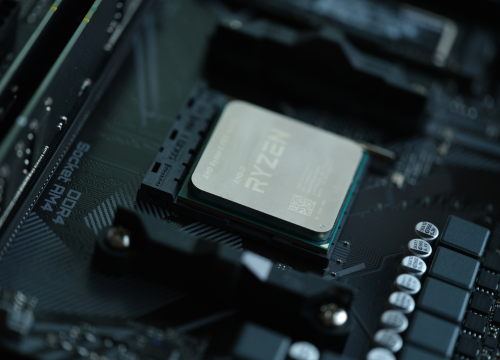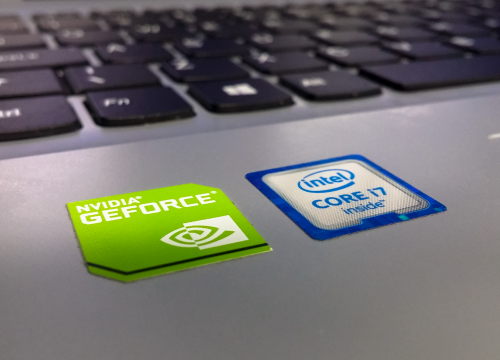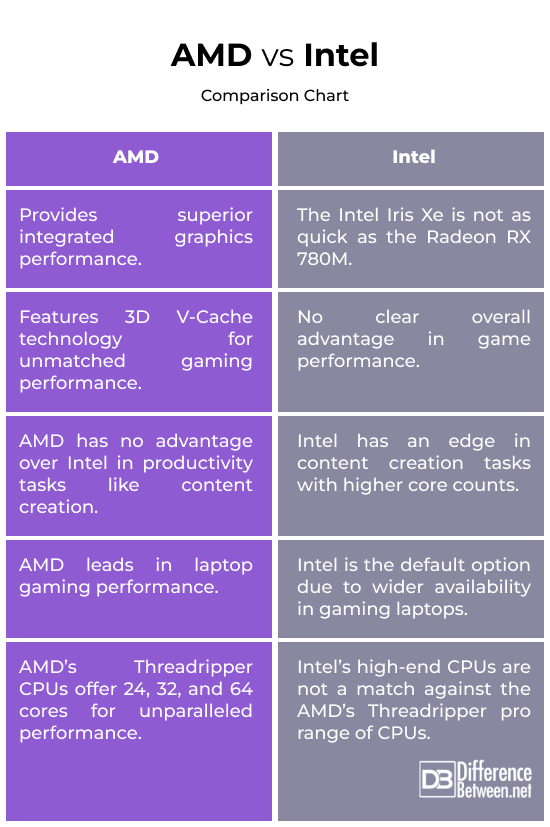Difference Between AMD and Intel
AMD and Intel are the two brands you can choose from if you want the best CPU for games or your workstation. The company Intel has been around since the 1970s and has been the leader ever since. When it comes to gaming computers, AMD chips are a bit better than Intel chips.
Compare Intel and AMD in this short video to see which one is better.

AMD
AMD (Advanced Micro Devices) is a big company that makes microprocessors and other technologies that go with them. They also make flash memories, customizable logic devices, and circuits for networking and phone systems.
Since 1969, Jerry Sanders and a group of former Fairchild Semiconductor leaders have run the business. At first, the company mostly made processing chips and RAM (Random Access Memory). However, AMD became well-known when it started making microprocessors that worked with Intel’s 8086 and 8088 in the early 1980s.
In the early 2010s, AMD had trouble because Intel was the market leader in CPUs. That being said, AMD came back in 2017 with the Ryzen line of CPUs.

Intel
Intel makes a lot of money and is one of the biggest chip companies in the world. Intel makes the chips that are inside most personal computers around the world. R. Noyce and G. Moore started the business on July 18, 1968.
One of Intel’s first big steps forward was making the Intel 4004, which was the first computer that could be bought by the public. That was the start of Intel’s dominance in the chip business.
Intel does a lot more than just make CPUs. They’ve been working on cool things like improved manufacturing and designing chips. Also, they aren’t afraid to look into AI and images technology that work together.
Difference between AMD and Intel
PC Gaming
AMD has the best processors for high-end gaming PCs. The Ryzen 7 7800X3D and Ryzen 9 7950X3D, for example, have the game-changing 3D V-Cache technology. AMD’s 3D V-Cache processors have stacked cache that greatly improves L3 Cache, making it the best for PC games.
Productivity Tasks
Intel is clearly the best at productivity jobs, thanks to the way it designs its processors so that they have both large performance cores and small efficient cores. It gives Intel an edge when it comes to making content.
While the AMD Ryzen 7700X has the same number of cores and threads as the Intel Core i7-13700K, it only has 8 cores and 16 threads. Intel is better at jobs that need a lot of processing power because it has more cores and threads.
Mid-Range Segment
In the mid-range segment, both AMD and Intel present competitive options, such as the AMD Ryzen 7 7700X and Ryzen 5 7600X, as well as Intel’s Core i5-13600K and Core i5-13500. Game performance varies between the two, with no clear advantage based solely on PC game performance.
Laptop Gaming
While AMD holds its ground with the Ryzen 7945HX3D featuring 3D V-Cache, the limited availability of AMD hardware in gaming laptops gives Intel the default position in most devices. Differences in performance are often overshadowed by other laptop qualities, such as cooling systems, displays, and GPUs.
This round is a tie.
Platform and Software Features
AMD gains an edge with its socket refresh to AM5, offering improvements like DDR5 memory and PCIe 5.0 support. AMD’s commitment to supporting AM5 through 2026 provides users with potential future CPU upgrades.
Intel uses Socket 1700, which provides support for both DDR4 and DDR5. Plus, it also supports PCIe 5.0. While it’s versatile, it may see changes with upcoming processor generations.
Integrated Graphics Performance
If you’re looking at integrated graphics, AMD is better than Intel. Intel’s Iris Xe graphics aren’t as good as AMD’s Radeon graphics cores, even the latest ones like RDNA 2 and RDNA 3. The Radeon RX 780M, which is AMD’s best integrated graphics card, is much faster than the Intel Iris Xe.
However, not all AMD processors feature high-performance integrated graphics.
AMD vs. Intel: Comparison Chart

Summary
For everyday tasks like browsing the web, watching Netflix, and handling emails, both Intel and AMD CPUs work really well. But when it comes to heavy tasks like video editing or running lots of apps at once, Intel’s laptop CPUs are a bit faster. However, AMD’s aggressive core counts deliver unmatched PC gaming performance.
FAQs
Which is better, Intel or AMD?
For everyday tasks like browsing the web, watching Netflix, and handling emails, both Intel and AMD CPUs work really well. However, AMD clearly steals the show when it comes to gaming performance.
Why AMD is cheaper than Intel?
AMD’s business model has lower overheads, which allows them to maintain affordability. AMD offers comparable performance to Intel at a lower cost.
What is the difference between Intel and Ryzen?
AMD Ryzen CPUs use the Zen core architecture, focusing on fitting lots of cores and threads into each processor. Ryzen 5 and 7 chips, which are popular for everyday use, can have 6, 8, 12, or even 16 cores.
Intel desktop CPUs like Core i3, i5, i7, and i9 usually go up to 8 cores in most processors.
Is Ryzen 7 better than the i7?
Generally, Ryzen 7 and Core i7 CPUs offer similar performance, but the specific features, clock speeds, and the number of cores/threads can vary between individual models.
Which is better, Ryzen or Intel for laptop?
One great advantage of AMD processors is that they’re more budget-friendly. Plus, they are great for heavy multitasking tasks.
Which processor is better, Ryzen or Intel?
Ryzen processors provide good value for money, while Intel excels in single-treaded performance.
- Difference Between Caucus and Primary - June 18, 2024
- Difference Between PPO and POS - May 30, 2024
- Difference Between RFID and NFC - May 28, 2024
Search DifferenceBetween.net :
12 Comments
Trackbacks
- Difference Between Quad Core and Dual Core | Difference Between
- Difference Between Xeon and Core 2 Quad | Difference Between | Xeon vs Core 2 Quad
- Difference Between Pentium and Celeron | Difference Between | Pentium vs Celeron
- Difference Between Itanium and Xeon | Difference Between | Itanium vs Xeon
- Difference Between Core i5 and Corei7 | Difference Between | Core i5 vs Corei7
- Diffference Between AMD Athlon and AMD Turion | Difference Between | Diffference Between AMD Athlon vs AMD Turion
- Diffference Between AMD Athlon and AMD Turion | Difference Between | Diffference Between AMD Athlon vs AMD Turion
- Difference Between AMD Sempron and Intel Celeron | Difference Between | AMD Sempron vs Intel Celeron
Leave a Response
References :
[0]Image credit: https://www.canva.com/photos/MAEt2ruue30-amd-ryzen-processor-installed-in-motherboard-slot-am4-closeup/
[1]Image credit: https://www.canva.com/photos/MADGx19yJ-w-gray-laptop-computer/
[2]Martindale, Jon, et al. “AMD vs. Intel: the rivalry has never been more fierce.” Digital Trends, 14 Dec. 2023, www.digitaltrends.com/computing/amd-vs-intel/.
[3]Smith, Matthew S. “AMD vs. Intel: Which CPUs Are Better for Gaming?” IGN, 6 Feb. 2024, www.ign.com/articles/amd-vs-intel-cpu-comparison.
[4]Alcorn, Paul. “AMD vs Intel: Which CPUs Are Better in 2023?” Tom’s Hardware, 28 July 2023, www.tomshardware.com/features/amd-vs-intel-cpus.
[5]Kingsley-Hughes, Adrian. “AMD vs Intel: Which desktop processor is right for you?” ZDNET, 6 Dec. 2022, www.zdnet.com/article/amd-vs-intel-which-desktop-processor-is-right-for-you/.

Just did an assignment based on your post, thank you so much for posting this 🙂
Based on my own experience, Intel is better than AMD on processing. Intels’ processors defeat AMD processors on L3 Cache. But many computer enthusiast suggest to buy AMD rather than Intel because its cheaper. But, if I am the who suggest others to buy AMD, the only reason is AMD has more paths of upgrades that Intel. And you can also experience the satisfaction of Intel’s processors on AMD processors.
Thank you for such a nice description.
Thank u soo much ..
Because I know the difference of these…